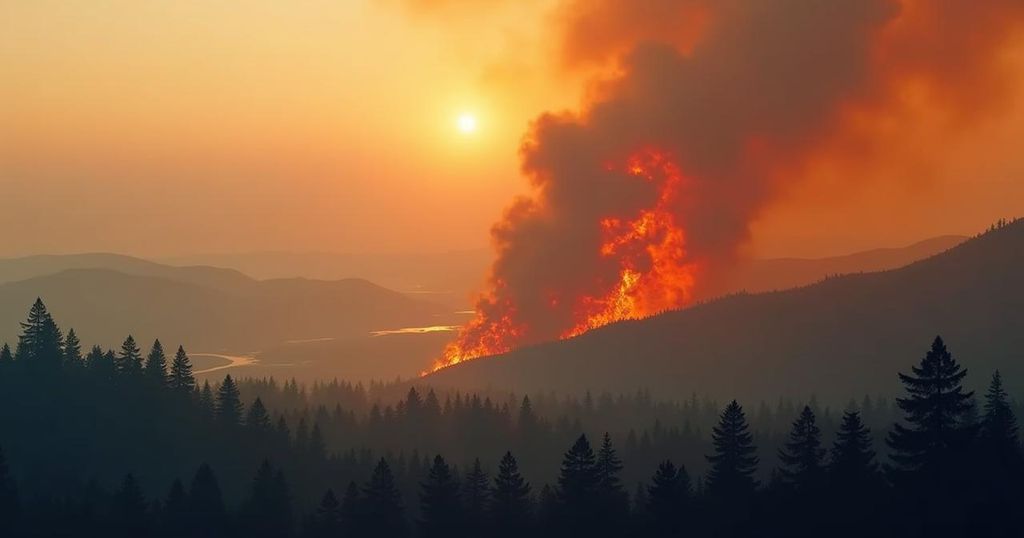A Cry for Help: The Amazon’s Flames and South America’s Environmental Crisis

Wildfires in South America, exacerbated by drought and climate change, are devastating the Amazon and causing significant public health crises. Areas like Rondônia in Brazil report severe air quality issues, while fires spread across multiple countries, leading to widespread ecological damage and loss of life. Health officials warn of a continental emergency and stress the urgent need for collective action to address this environmental catastrophe.
The beauty of Rondônia, a significant region in the Amazon rainforest of Brazil, is rapidly diminishing as devastating wildfires ravage South America. The haze resulting from these fires extends from Ecuador to Paraguay, causing grave concerns for public health and safety. In Porto Velho, the capital of Rondônia, residents are experiencing severe respiratory issues and disruptions to daily life, as visibility is drastically reduced and health care services are overwhelmed by smoke-related illnesses. Dr. Lilian Samara de Melo Lima, a general practitioner in the area, recounts how these fires are not solely a seasonal occurrence this year, defined as “truly atypical” due to the intensified human activity, particularly by cattle ranchers and agricultural ventures exploiting the Amazon’s resources. The health secretary of Porto Velho, Marilene Penati, echoed these sentiments highlighting a continent-wide crisis as wildfires proliferate throughout neighboring countries, catalyzed by a prolonged drought accentuated by climate change and the El Niño phenomenon. According to Erika Berenguer, a scientist from Oxford University, there has been a record-keeping of fire hotspots not just in Brazil, but also in Colombia, Guyana, and Venezuela, revealing the widespread nature of this crisis. Paraguay is seeing significant ecological damage in the Chaco ecosystem, with over 180,000 hectares burned in a protected reserve, impacting the lives of Indigenous communities such as the Ayoreo, who are displaced by the fires. On a more tragic note, Peru has faced grave casualties due to fires that have escalated to emergency levels in multiple regions, with critics pointing out the misattribution of causes by governmental leaders. The severity of this situation is further showcased by Christian Rivera, an Ecuadorian paramedic, who noted an unprecedented scale of emergency in Quito due to widespread smoke and ash from the fires. Likewise, in Bolivia, rampant wildfires in Santa Cruz have led President Luis Arce to declare a national disaster, with millions of hectares lost, indicating the severity of the environmental crisis at hand. In the midst of this calamity, Penati poignantly remarked, “The Earth is sick … the Earth is crying out for help,” urging for collective global action to mitigate the ongoing environmental deterioration. She expressed profound sorrow over humanity’s negligence towards the planet, emphasizing the urgent need to rectify our eco-destructive behaviors before it is too late.
In recent months, South America has faced unprecedented wildfires primarily fueled by human activities, such as land clearance for agriculture and livestock farming. The Amazon rainforest, known for its rich biodiversity and critical role in global climate regulation, is significantly affected by these fires. The current environmental crisis has been intensified by climatic challenges, including a notable drought period influenced by El Niño and broader climate change effects. These conditions have set the stage for widespread ecological devastation across the continent, impacting both urban areas and remote ecosystems.
The severe wildfires sweeping across South America illustrate an alarming environmental crisis that transcends national borders, highlighting the urgent need for a collective global response. As air quality deteriorates and ecosystems are destroyed, officials and health care leaders urgently call for recognition and action against the underlying issues of climate change and unsustainable land-use practices. The heartfelt pleas from local health officials serve as a reminder of the critical intersection between human health and a healthy environment, urging society to heed the warnings of this ecological emergency before it escalates further.
Original Source: www.theguardian.com





